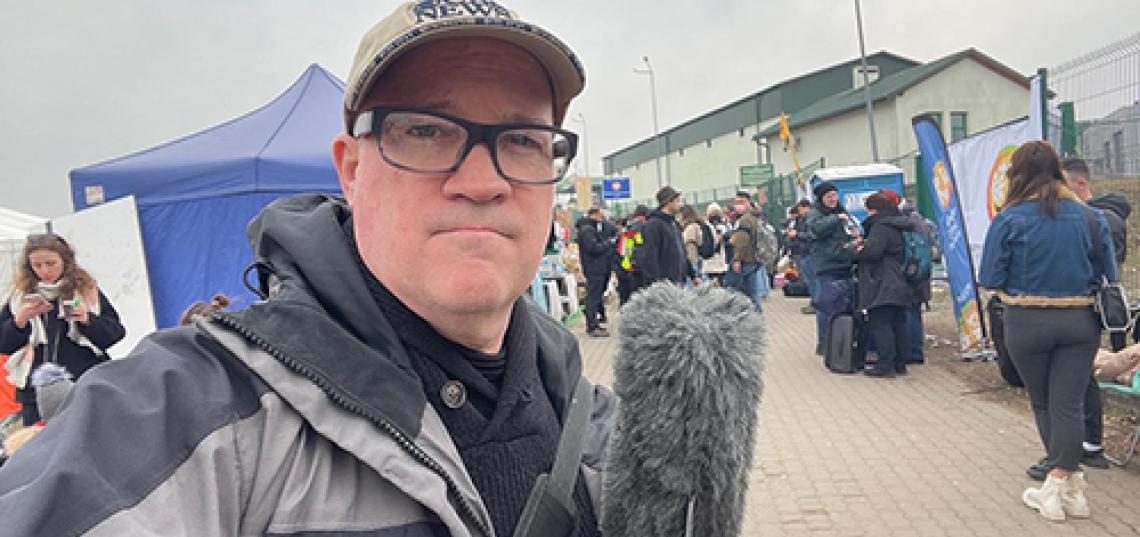
At dawn on February 24, 2022, Russia’s invasion of Ukraine began, and soon after, SC&I alumnus T. Sean Herbert JMS’90, an Emmy-award winning producer for CBS News, was on the Ukrainian border in Poland working as the producer for Washington D.C.-based correspondent Christina Ruffini.
Herbert said during the month of March 2022 he and Ruffini reported on fleeing Ukrainian refugees; the World Central Kitchen; a pediatric hospital; American servicemen; American state department officials; and Radio Free Europe.
Herbert, who earned a bachelor’s degree in Political Science and Journalism and Media Studies from Rutgers and a Master of Science degree in Journalism from Northwestern University, has a vast amount of experience reporting on calamities. He covered 9/11, spending six weeks at ground zero; natural disasters including Hurricanes Maria and Ida, and many earthquakes, tornados, wildfires, and mudslides; and the COVID-19 pandemic.
Addressing how he accepts and faces the life-threatening dangers his career involves, Herbert said, “Journalists are essentially second responders. We are not first responders – we are not expected to administer first aid, nor to carry a weapon, but we are often following first responders going into harm’s way. I became a journalist to right wrongs and inform the public, just as my professors at Rutgers University taught me.”
Below, Herbert describes his experiences covering the humanitarian crisis along the border in Ukraine.
Where were you stationed in Poland?
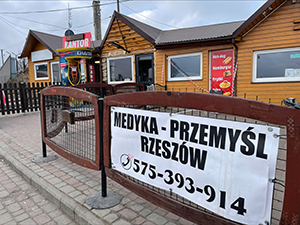 We flew into Warsaw from London and drove several hours southeast to the Polish border, which was the location of the largest crossing of Ukrainians fleeing the conflict. The nearest town – a small city, was Rzeszow.
We flew into Warsaw from London and drove several hours southeast to the Polish border, which was the location of the largest crossing of Ukrainians fleeing the conflict. The nearest town – a small city, was Rzeszow.
Rzeszow has a train station and some other infrastructure and most importantly housing. At the time, women and children who came across the border, usually in parties of 3-7 people, could find temporary housing there and then, through public transportation, be brought to larger cities in Poland or larger cities in Western Europe to meet up with family or host families.
Rzeszow was our home base, and it was also where American State Department Embassy officials who were evacuated from the American embassy in Kyiv, were temporarily relocated.
Ruffini and I worked as part of a CBS News team. Broadcast news, by definition, is collaborative. On any typical assignment, producers work in tandem with a correspondent; technical staff from camera, audio, and transmission; bookers; and the executives, senior management back at home who vet our scripts. Even the finance and risk assessment teams are considered part of the broadcast team. I could not do my job without collaborating with these other very experienced and talented people.
What did you learn from the Ukrainian people you interviewed?
I was absolutely guffawed – my jaw dropped when my own eyes were witnessing the wall of humanity walking out of Ukraine, a sovereign country, into Poland. It was clear that they were perhaps leaving their lives, their existence, their possessions, their world as they knew it behind, perhaps permanently. That was crystal clear to me from the moment I arrived.
The town Medyka near Rzeszow was ground zero for the flood of Ukrainian citizens fleeing for safety. With the help of a fixer/translator we interviewed them. They were almost all women and children with some elderly men, although not many.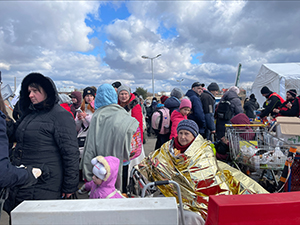
They all told essentially the same story: that they feared for their lives, that they had family or friends elsewhere in Europe, and they did not think this conflict would be quick or painless. For the safety of their children, they said, they needed to live elsewhere temporarily.
Some told harrowing stories of fleeing in-between shellings in towns that were hit the hardest by the Russians, such as towns along the Black Sea like Odessa. We know that many of them left behind their husbands with great trepidation. They told us stories about saying goodbye perhaps for the last time to the young men in their lives, and in some cases to two generations at the same time. For example, their sons who were 18 or 19 years old and their husbands who were 45 years old. There was great sadness in their eyes, and great fear, and we didn’t have to ask those questions to know that’s what they were going to say. There was a lot of uniformity in what we were hearing.
We asked the women, where are the men? And the answer was almost always the same – they stayed behind to fight, to protect their belongings, in hopes that one day soon they would be reunited with their wives and their children and their elderly parents and grandparents. Those were the stories we were told every day.
In addition to covering the plight of the fleeing refugees, did you report on other events at the border?
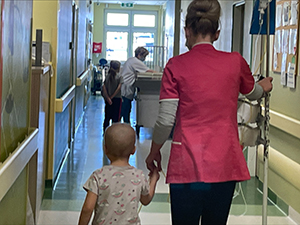 We covered a Polish pediatric hospital where cancer patients who had fled Ukraine had been evacuated. We reported on the work of the World Central Kitchen. I am a huge fan. They do amazing work -- it is the work of the chef José Andrés. Wherever David Begnaud and I go where there is a natural disaster, World Kitchen is there just as fast as we are. They have even chartered helicopters before we’ve had the chance to! They are quite something!
We covered a Polish pediatric hospital where cancer patients who had fled Ukraine had been evacuated. We reported on the work of the World Central Kitchen. I am a huge fan. They do amazing work -- it is the work of the chef José Andrés. Wherever David Begnaud and I go where there is a natural disaster, World Kitchen is there just as fast as we are. They have even chartered helicopters before we’ve had the chance to! They are quite something!
In Poland, they set up their kitchen in the town Przemysl. They commandeered an old warehouse and brought in massive cauldrons to make local dishes that they then put in vans to take hot meals to the border.
One story we did that I was very proud of was about an American paratrooper based in Italy who used his vacation to go to the train station in Rzeszow where he bought and offered plane tickets and hotel rooms to the women and their children fleeing, just so they had places to stay temporarily until they boarded that plane, train, or bus to Warsaw or Berlin. Some people fled all the way to Paris and London and even a few went to the U.S.
For our last assignment, we pitched to the executive producer of CBS Sunday Morning a profile of Radio Free Europe and its resurgence and its importance during the conflict. They green lit it, so on our way out of Poland, instead of flying from Warsaw back to London, we drove to Prague and spent a couple of days with Radio Free Europe.
Do you have advice for current JMS students who aim to someday cover dangerous assignments as a journalist?
It helps to remember what journalism is. I say that because I don’t think the average viewer even knows what the definition of a journalist is these days. They also lack a sense of what journalists are being asked to do and what they must know to do it well.
We must never equate journalism with punditry, or show business, or entertainment.
In my opinion, a journalist is a civil servant for society. Journalists are much like first responders. They are asked to go into areas where the rest of the public is fleeing. They are asked to hold elected public officials accountable. They are the watchdogs of a democracy. They are a line of defense for the public on their behalf. They must ask tough questions. They have to be the eyewitness to history to either bring about change or to protect the public that we ultimately, I believe, serve.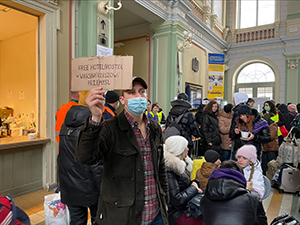
It’s one thing to ask the who, what, when, where, why questions – it’s another to be able to survive and thrive in a difficult environment. And that could be as simple as this scenario: you are going to cover Hurricane Ian – and are told by CBS News that they believe landfall could be anywhere between Fort Myers and Sarasota and that you might have to go for a few days or weeks without electricity, food, or communications. How prepared are you to do that assignment well?
What advice do you have for JMS students hoping to follow in your footsteps as a broadcast journalist? How can they best prepare for the job and maintain long-term success?
Three pieces of advice:
One, master every technical tool there is for doing your job, whether that be typing, or operating a camera, or a recording device. There is no aspect of the job that I haven’t been asked to do. I am often the only camera and audio person.
I was in Haiti a year and a half ago, August of 2021, and the crew that was being sent to work with me couldn’t get into the country. So I was literally the camera person, the audio person, I was overseeing transmission, I was the booker, the anchor buddy, and the remote producer. I literally had to do it all for 24 hours, which felt like an eternity, especially because at the network level we typically have more resources than local TV news where a reporter might be working with an iphone and that’s fine and enough.
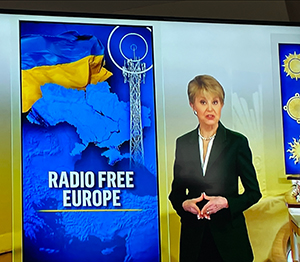 At that moment I was winging it and trying to master it all and when you have to do 10 jobs well you don’t do any of them well. The point is, the next generation is being asked to do more and more with less and less. Less oversight, less collaboration, less teamwork.
At that moment I was winging it and trying to master it all and when you have to do 10 jobs well you don’t do any of them well. The point is, the next generation is being asked to do more and more with less and less. Less oversight, less collaboration, less teamwork.
Two, do not do it for the fame and fortune. You have to love what you do. I always say, and if you quote me, it will be the 40th time Sean Herbert has been quoted as saying this, but I love every job I’ve ever had. I am forever grateful to all of my employers because they’ve given me the opportunity to tell stories and make a difference in the world.
There is no glory in being a journalist. You may be asked to knock on the door of someone who just lost a young child, or witness three generations who just lost their entire farm to a tornado. You must have the courage to look someone in the eye who has done something criminally wrong and ask them why they did it and hope you get an honest answer. You have to bear witness to horrible moments in history.
Of course, there are plenty of beautiful stories and heartwarming, uplifting stories that you will do too. However, that’s probably not the job you are going to be asked to do nine out of ten times, and you sure can’t expect to get that assignment every time.
My health has been impacted by long-term exposure to the terrible things that have happened at places like 9/11, and from the asbestos in the air after tornados, and the biohazards I was exposed to covering the COVID-19 pandemic for a year. I know exactly where I was and how I contracted Covid. I was in an ICU ward in PPE -- the only person filming as an ICU nurse was administering care to a very sick COVID patient.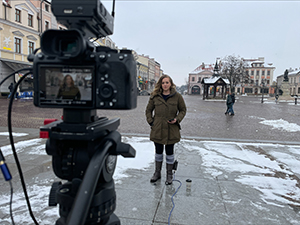
My third piece of advice I have not followed: It is simply that as a whole journalism does not offer a quality of work-life balance. It is almost your duty to your family and your friends to find that balance somehow someway.
Discover more about the Journalism and Media Studies major at the Rutgers School of Communication and Information on the website.
Photos courtesy of T. Sean Herbert, CBS News
A Selection of March 2022 CBS News coverage by the CBS News team including Ruffini and Herbert:
March 2, 2022: Influx of Ukrainians at Ukraine-Poland border
March 5, 2022: Many Ukrainians flee to Poland as Russia continues to attack
March 6, 2022: 1.5 million refugees have fled Ukraine to neighboring countries, U.N. says
March 7, 2022: Refugees fleeing war in Ukraine face evolving situation as they arrive at Polish border
March 8, 2022: Ukrainian women join the fight from the border as families cross borders
March 10, 2022: U.S. paratrooper helps Ukraine refugees navigate through Poland: "I can't do nothing"
March 15, 2022: Ukrainian refugees find support in Poland
March 27, 2022: Breaking through Russia's digital Iron Curtain
